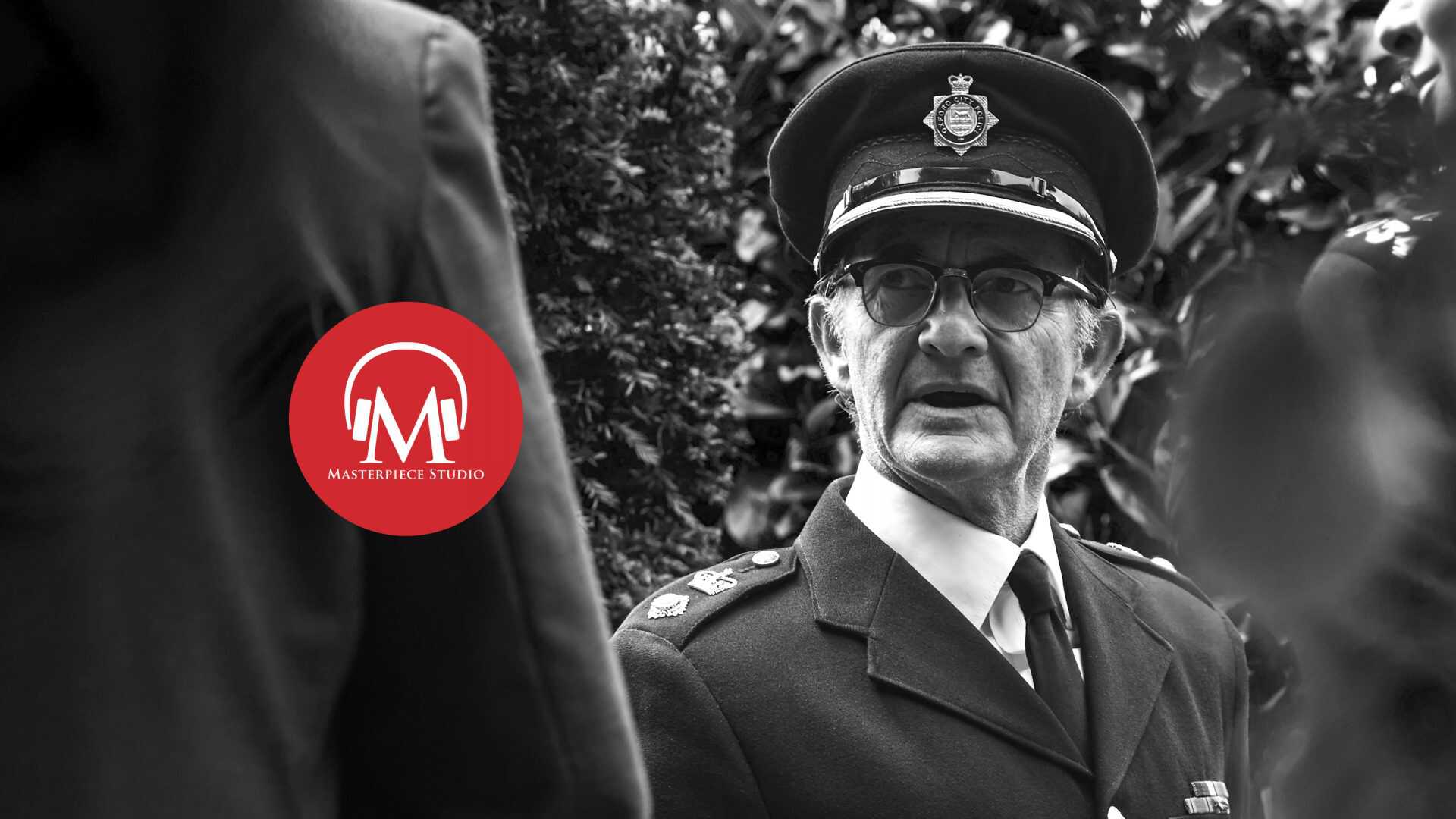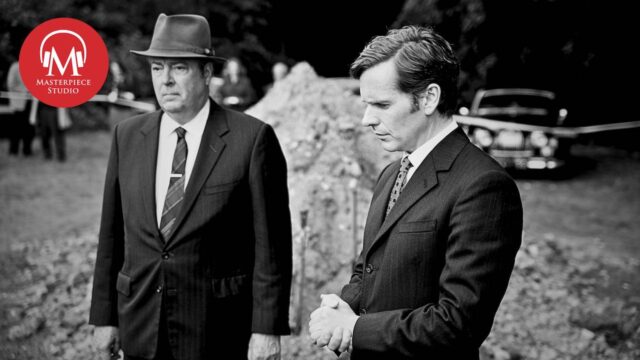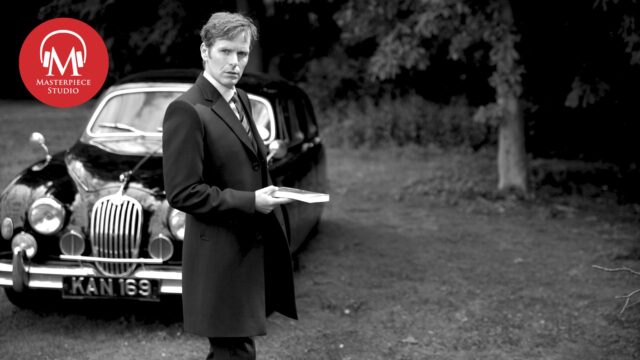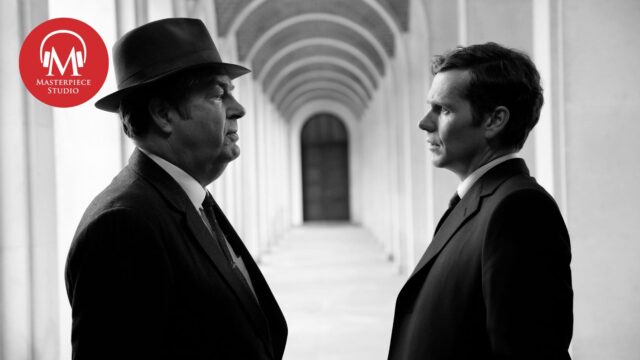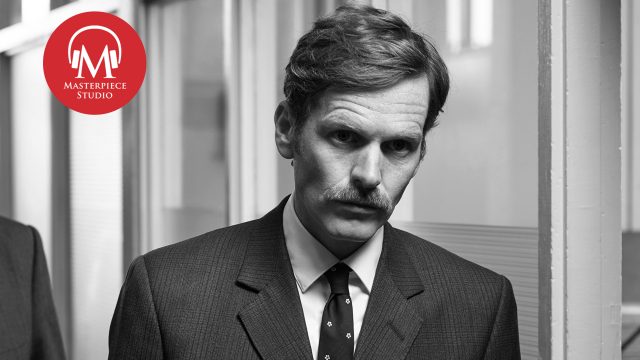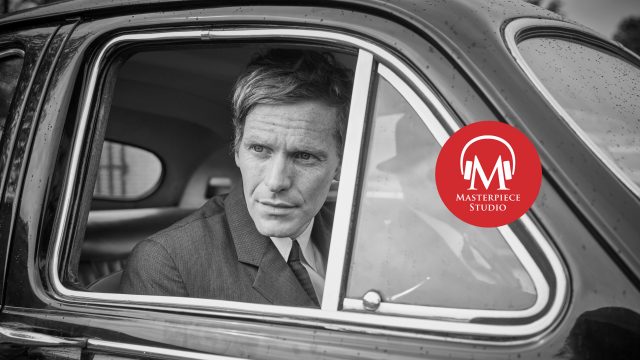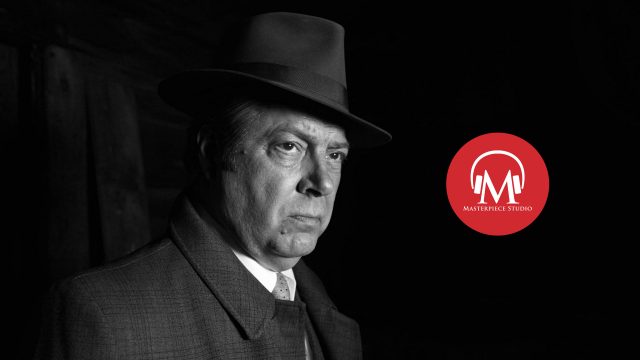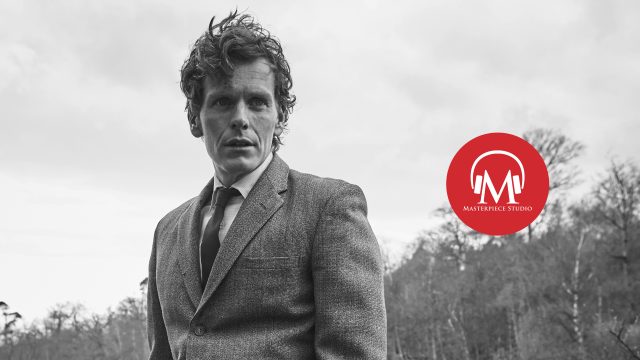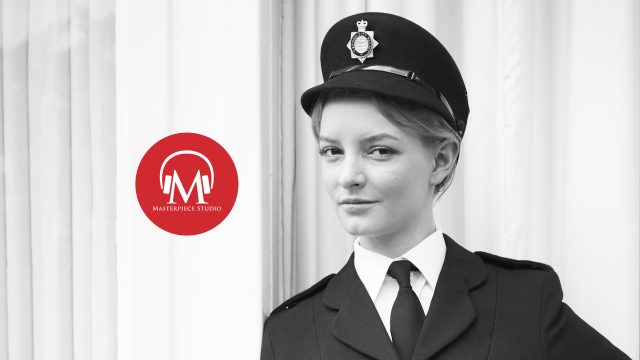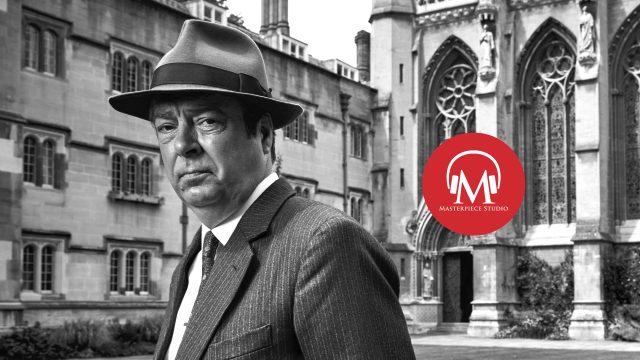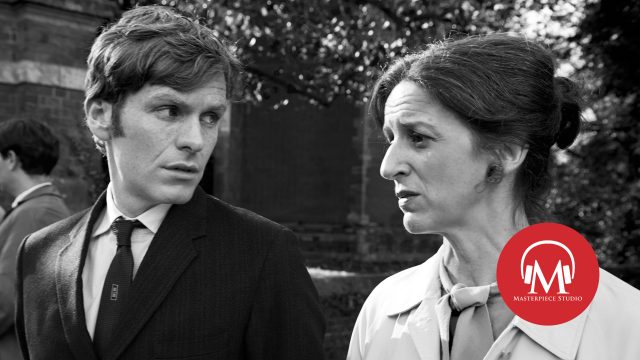These days, Anton Lesser is most recognized for playing two very different characters: Endeavour‘s Chief Superintendent Bright and Game of Thrones’ Qyburn. Now, in the aftermath of his standout performance in Endeavour‘s “Prey,” the seasoned British actor talks with us about his roles both past and present, heroic and murderous.
Download and subscribe on: iTunes | Spotify| RadioPublic
Transcript
Jace Lacob (Jace): MASTERPIECE Studio is brought to you by Audible. For a free trial, go to Audible.com/Masterpiece.
CLIP:
Doc: Well, this was no punting accident. It wasn’t a boat propeller. And it wasn’t Lizzie Borden.
Jace: I’m Jace Lacob and you’re listening to MASTERPIECE Studio.
There’s a stone-cold killer running wild through the countryside, and it’s up to the Oxford City Police to stop him. Their biggest problem: the murderer seems to be less man and more…cat.
CLIP:
Bright: Well, whatever it is, I’ve given orders it is to be shot on sight. If it’s turned from cattle to human flesh, there’ll be no going back.
Believe me, I know.
Jace: As the feline’s killing spree wears on, the stakes to find the beast become even higher. But when it’s Morse’s life on the line, Chief Superintendent Bright rises to the occasion and shoots the tiger dead in its tracks.
In the end, Bright gets his redemption, and we get a rare glimpse into the past of this rigid man.
CLIP:
Anton Lesser: …suddenly you see something underneath, something vulnerable, and I’ve been longing for that and I loved it.
Jace: On this episode, seasoned British actor Anton Lesser takes us deep into the mind of Chief Superintendent Reginald Bright, along with many of the other characters he’s played including Wolf Hall’s Thomas More, and Game of Thrones’ Qyburn.
Jace: This week we are joined by Anton Lesser. Welcome.
Anton Lesser (Anton): Thank you.
Jace: When we first meet Chief Superintendent Bright, he’s a bit of a martinet in a stuffed shirt, all Spanish practices and tabula rasa
Anton: Yes.
Jace: What was your take on the character when you were first approached about the role?
Anton: Well, he is, as you say, very buttoned up and very old school. I liked the fact that the potential was there to see him come apart a bit, and to see the man behind the uniform and the military education. And I think… I hope I’m persuading the writers that’s an interesting route to go. Gradually, we’re seeing signs of that coming back into the scripts.
Jace: Is he a product of another time, another place?
Anton: Yes, I think he is. I think he is out of his time, but not, curiously, out of his depth, because even though he’s a bit of an anachronism, and the sort of rather rigid, po’ faced adherence to things very, to us outdated, actually is a great foil for Endeavour’s, well, out of the box way of working.
CLIP:
Morse: Oh, well…
Bright: Yes, ‘Oh, well’! I appreciate such hateful grubbiness may accord with your ‘four legs good’ view of the world. But it does not make it so. It does not make it a fact. It does not make it true.
Jace: Is it that out of box thinking that does rub Bright the wrong way in the show’s first two seasons?
Anton: I…Do you know, even though we’ve done three series, I find it difficult to say what it is specifically that causes the friction, but that’s certainly an aspect to it. I think there’s an element of thinking that Endeavour is a bit of a hippie. So I mean, for somebody who’s very raison d’etre is to be very correct and whose safety and the safety of others depends on that correctness it must have been very difficult to cope with the feelings that would arise in the situation, you know, where people are coming from very opposite poles to the same challenge.
Jace: He does seem shaken this season. How has Bright been affected by the events at Blenheim Vale at the end of the season two?
Anton: Yeah, that has been sort of seismic really, because he wants to honor the structures that he has been part of, and yet this Blenheim Vale abuse of power is totally against his own feelings as a human being.
So, it’s been huge for him, it precipitates all sorts of pressure for Thursday as well: for his own reasons, he finds himself in difficult situations with criminals who he absolutely knows are guilty.
CLIP:
Hodges: I didn’t touch her. And there’s no way you can prove that I did.
Thursday: Can’t prove it. Can’t prove it?
Morse: Sir!
Thursday: Can’t prove it?!
Morse: Sir!
Anton: He’s put in the position where all he wants to do is just hit someone. (Laughs) And that mixed with Bright’s need to adhere to the book and yet to be sensitive to his officers and the pressures they’re under, it makes for a very, sort of potent, dramatic cocktail, and it’s …it’s very refreshing to play the part.
Jace: In “Ride,” Bright nearly says something to Morse about what happened, but cuts himself off. Saying instead, quite simply…
CLIP:
Bright: I can’t change yesterday, but…a better tomorrow, yes? For all of us.
Jace: What does he stop himself from saying do you think?
Anton: That’s a good question. I think he stops himself from saying, “You took the bullet for all of us who have to remain silent.” What…He’d like to be able to show his heart, as we all do, because he has been touched by what’s happened and I think he actually genuinely cares for this young man, but he has to present a different face and you know, I really want to … I want to be able to see what’s not said, a lot more as we go on.
Jace: I read that there was a scene in “Ride” that was filmed, but cut in which Bright and Thursday do sort of discuss Blenheim Vale and its aftermath in more detail. Do you recall what was in that scene?
Anton: Yes, it was a scene where we see Endeavour go to Bright’s house off duty and… Bright is found trimming his hedge in front of his house, wearing a little bowtie and very un-Chief Superintendent looking.
He says, “Oh, Endeavour. Come in.”
They go inside and likely, the proper Englishman he is, Bright says, “I’ll put the kettle on.”
When he goes into the kitchen, we see Endeavour taking in the living room and the photographs in this man’s house that he knows nothing about. I don’t want to say too much about who’s in the photo because it might be something that we revisit. I was promised that there was no time for that scene; it would feature very soon.
I think we will find there’s more to Bright that meets the eye. I mean we know that already, but I think we’re going to see more of that sort of thing with Reginald.
Jace: Going into Endeavour, how familiar were you with Morse or Lewis?
Anton: Nothing at all. I, you know … I’ve never… I don’t think I’ve ever seen an episode of either of those shows. How I’ve missed them, I have no idea.
Jace: In this week’s episode, we finally get a look at Bright’s back story when he recounts the story of the tiger in India that killed McKendrick.
CLIP:
Bright: First thing I knew was this fearful blow to my left arm. McKendrick was being hauled down the tree with his neck in the tiger’s jaws.
Jace: How does his guilt and this particular story shape Bright?
Anton: Well, you know in a way, I think we don’t yet know. I think that’s… What we see in that episode is the thin end of the hopefully very interesting wedge that’s just the beginning of an unraveling of what has brought him to become the man he is. It’s something that has haunted him and that has continued to make his own assessment of himself as somebody inadequate. Somebody who didn’t do it right. For all his good intentions, something wasn’t enough.
CLIP:
Bright: Yes, that was the end of the man-eater of Kot Kindri.
Trewlove: Sounds frightfully heroic.
Bright: No, I fear not. A hero would have saved McKendrick.
Anton: More than that, I can’t really say, but my instinct is that, it’s what makes him vulnerable, in spite of the crust that we see that there is a heart of a human being, is insecure and is complicated and is in need of love as everybody else on the planet.
Jace: And he does surprise us in this episode as well: he goes to see Thursday and he loses his temper quite badly.
CLIP:
Bright: You could have had him! Clean and by the book.
Jace: But then he stops.
CLIP:
Bright: Hodges fell down the steps on the way back to his cell.
Jace: Why does he decide to cover for the clearly ailing Thursday at this point?
Anton: I know. It’s intriguing isn’t it? I… it doesn’t worry me, it doesn’t worry me as an actor doing the scene that I didn’t have a very clear answer to that.
He compromises because there is something that’s touching him more deeply than the rules and regulations. Because he– he feels that he has… he has let them down. At the start of the series, he says, “I let you down. I let my men down, I let the force down.”
So I think this is kind of another little opportunity: is he going to let them down again, and watch this wonderfully able officer end his career on a really awful black note? Or, is he going to be brave and take it upon himself and add to his own guilt if you like, because I’m sure he goes home and feels guilty for taking this action, but it’s complicated.
Jace: He is … He does inspire bravery as well though. There’s this speech that he gives to the team when they arrive at the maze.
CLIP:
Bright: Our friends are in peril of their lives. They would not fail us. No more should we fail them.
Jace: Which has this rousing quality that we don’t normally get from Bright, but he’s very gifted with words.
Anton: He does. When he… when the situation calls for it, you’re right, he does come out with some stirring stuff and (laughs). And I think that’s great. When the time calls for it, he steps right up and he says it like it is. Yeah.
Jace: It’s Bright who comes to the rescue ultimately, saving Endeavour from a very likely death by tiger mauling. What was it like shooting this scene in which Bright fells the tiger so spectacularly and unexpectedly?
Anton: Well, it was thrilling. I’ve never been so close to a big cat like that. I’m not a sort of gun-toting sort of person. So I had to learn to look as if I knew what to do with a rifle, but in a way it was quite kind of good that I didn’t look completely at home, because I think that was part of the fun of it. Of course, he comes up with the goods and it’s quite nice that you have a very unlikely sort of hero. Yes, so it was fun and very gratifying to suddenly be the one who saves the day.
Jace: Does his action here, the killing of the tiger and the saving of Endeavour, balance the scales, as it were, for Bright, who couldn’t save McKendrick in India?
Anton: Oh, that’s interesting. I hadn’t… I– To be honest, I hadn’t… I hadn’t thought of that.
I don’t think it balances the scales any more than, you know, any of us who regrets something we’ve done in the past. We might do something that appears a sort of vindicating activity, you know, that we might think, “Well that now makes up for that.”
Logically yes, but I think, no. It’s more complex, isn’t it? Psychologically if we’ve fallen short in some way, even in a very mundane way, you know…I don’t think just doing a good deed, necessarily wipes that out.
It’s something he’ll always carry with him, and in that respect. I think it’s very typical of the human condition. It’s that lovely paradox, isn’t it, that every moment is new and potentially can change a future, but I don’t think it necessarily changes the past.
Jace: I love the dynamic this season between Bright and WPC Trewlove who arrives at Cowley.
Anton: Oh yes.
Jace: What do you make of their rapport?
Anton: Well, I’m loathe to say too much about where I have a suspicion this is all going, but there is a moment when Trewlove arrives when there’s a rather curious chemistry, and I think one could be forgiven for thinking, “Oh my goodness. Is Bright, enamored of this young– much younger woman? And if so, is that kind of a bit tasteless? Is that…What’s actually going on there?” I think something will be revealed, which is quite surprising. I can’t go into it. I’ve just had a hint from the writers that something that occurs a little bit later, and it’s to do with that scene that we didn’t get to do in the, in his house…But he clearly has an affection for this young woman, and he recognizes a real policing instinct in her that is lacking in a lot of his other officers.
And you get a very interesting situation where a man is actually finding aspects of this human being’s character, which go beyond gender and which challenge his own prejudices.
Jace: I have my own theory about their rapport.
Anton: Do you?
Jace: I do. I think she’s a, perhaps a surrogate of sorts for someone maybe he’s lost in his own life.
Anton: I like you instinct, and all I can say is, you may be right. (Laughs)
Jace: Now you seem to turn up on every show that I watch…
Anton: Oh, I’m sorry.
Jace: In a good way, in a very good way! Qyburn on Game of Thrones, Fagan on Dickensian, Clarence on The Hour, Thomas More on Wolf Hall…The list goes on, and on, and on. Do you have a favorite character that you’ve played or one that has stayed with you long after you’ve wrapped?
Anton: I loved playing Thomas More. I loved it for so many reasons, because I don’t think I’ve ever been involved in anything which has been so completely saturated in excellence and intelligence on every level. That one, I think is the one that really, really haunts me and I, and I … I was recently at the BAFTAs, the television awards; you know those things are strange because you think I’d be so honored and so flattered if I won, but I’ll be so relieved if I don’t because I’m going to have to go up and speak. It’s quite stressful, because you have to sort of think of something to say in case you win. I knew what I was going to say, or part of what I was going to say was that how much I just loved to be in this part. That I wanted to be in every scene.
Not only because I’m just an egocentric actor that just wants to be on screen all the time, but because I just loved doing the part. I want… It was just a complete joy, and yet at the same time, hugely challenging, because the bar is set so high when you begin. You think, “Oh, this really requires me to be up there with it. Maybe this is where I get found out, maybe this is the last job,” (laughs) but you love that kind of friction that comes from that. It’s just fantastic.
Jace: In reviewing Wolf Hall, the Guardian said, “Anton Lesser’s Thomas More is a masterclass in understatement.” How do you react to such praise and do you read reviews or avoid them?
Anton: Now I’m not asking you, so I can hear that praise again. I literally didn’t ask…I didn’t hear what you said about the Guardian. What was the quote?
Jace: The quote is, “Anton Lesser’s Thomas More is a masterclass in understatement.”
Anton: Really? My goodness. I don’t read reviews you see. I didn’t know about that. That’s very nice, isn’t it? Well I think it’s nice, maybe they’re saying that he’s just really lazy.
Jace: I don’t think so. I don’t think so.
Anton: Oh, that’s great. So what was the question; what did you ask me?
Jace: How do you react to praise like that, and do you read reviews or avoid them?
Anton: I haven’t read a review of myself since 1982 when I read, “This is the only production of Hamlet that would have been better off without the prince.” You know, you can just imagine, I don’t know if in your field if there’s a parallel, but I was doing that show and I still had probably, 50 or 60 … No, because it was press night, I had about 100 performances to do. If you read something like that, and you are not in the exalted position of taking praise and blame with equanimity, and I wasn’t, you’re going to be doing every show thinking of that review and thinking, “Oh my god, there’s people out there thinking the same. They hate me.”
And of course, you only, being human, you only remember the bad reviews. The good ones, you think, “They’re wonderful, but why did they think I was wonderful in that bit and not that bit?” It was just stupid for my own sake and for my fellow actors to be, you know, thinking of that. So I stopped reading them then.
Jace: What role are you most recognized for on the street?
Anton: Qyburn.
Jace: Qyburn.
Anton: Yes. Yes, and a little bit Endeavour. Sometimes I’m in the supermarket and somebody will say, “You were horrible to him last night again.” I say, “I beg your pardon.” “Bright, Reginald Bright.” Yeah, but I think at the moment because it’s so big, uh, Game of Thrones. Yeah.
Jace: What is it like joining a show that has such an intense level of secrecy and such passionate fans?
Anton: It’s great, I love it. I mean, you know, I’m not one of the big…the big engines of the piece; I’m not a big character in it. So I don’t… I don’t have that problem of people saying, “Oh, is Jon Snow going to live or … What happens, tell us about plots?” If they did, I wouldn’t be able to say anything, because we only get our little bits. We don’t get the whole script so I don’t have to pretend that I don’t know, I actually don’t know.
Jace: I was crushed that Dickensian wasn’t recommissioned for a second season by the BBC.
Anton: So was I, so was I.
Jace: I loved that show and I thought you were fantastic as Fagan.
Anton: Thank you.
Jace: What was the experience like playing Fagan in a world populated by so many of Dickens’ creations? Obviously you also played Charles Dickens…
Anton: Yes, I did.
Jace: …in 2002’s docudrama Dickens as well.
Anton: You’re very well informed about my career. You know more about it than I do.
Oh, I was mortified that it isn’t going again. I don’t know the politics of what led to it not going again, but I’m very surprised. I don’t know another author who touches the heart of the human condition more than Dickens, Shakespeare perhaps, Chekhov…So it’s a mystery to me. I really don’t understand. I just hope I’m not the kiss of death, because I’ve been in so many things that (laughs) haven’t gone again.
I was having a chat to Shaun, who plays Endeavour, when we began this. I said to him, “Gosh, this is Morse, young man. That went on for years, didn’t it?” He said, “Yeah.” I said, “So, this could be a job for you for life.” He said, “Yeah.” Then I said something like, “But, I don’t know. I’ve said that about so many things. Lovely series…I thought that was going to go again.” And I was musing on the things that I’ve been in.
He said, “Stop. So you’re the kiss of death, this is what you’re saying.”
I said, “I hope not,” but so far it looks like we’re safe.
Jace: Going strong. Finally, do you have a favorite scene from this third episode of Endeavour?
Anton: Oh yes, my…the tiger scene. For all the things we’ve … For all the reasons we talked about, because suddenly you see something underneath, something vulnerable, and I’ve been longing for that and I loved it. Those moments are precious for an actor and you just hope that they survive the edit. Happily it did.
Jace: Three episodes down, only one to go on this season of Endeavour.
Catch the finale next Sunday at 9 pm ET on MASTERPIECE. With more than one character’s life hanging on the line, it’s one you don’t want to miss…
Something else you won’t want to miss: next week’s episode of MASTERPIECE Studio!
Tune into our conversation with Endeavour’s leading man, Shaun Evans, on the finale and what’s in store for Morse’s future:
CLIP:
Shaun Evans: I don’t think they’ll be rivals, I don’t think they’ll be love interests, either. But I think we’ll have to just wait and see how that develops.
Jace: Get caught up on the behind-the-scenes magic of Endeavour and the rest of your favorite MASTERPIECE shows by listening to the MASTERPIECE Studio podcast. Find us at pbs.org/masterpiece and subscribe to the show on Stitcher and iTunes.
MASTERPIECE Studio is hosted by me, Jace Lacob and produced by Rachel Aronoff. Kathy Tu is our editor. Special thanks to Barrett Brountas and Nathan Tobey. The executive producer of MASTERPIECE is Rebecca Eaton.
MASTERPIECE Studio is brought to you by Audible.
Sponsors for MASTERPIECE on PBS are Viking River Cruises, Audible, and The MASTERPIECE Trust.
Endeavour Podcasts 10 More Podcasts
MASTERPIECE Newsletter
Sign up to get the latest news on your favorite dramas and mysteries, as well as exclusive content, video, sweepstakes and more.








